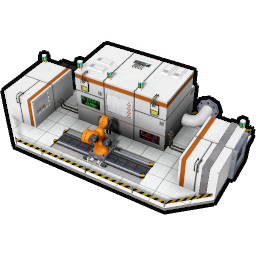Difference between revisions of "Microchip Machine"
Rosyriveter (talk | contribs) m (fixed broken link, Flat Sorter, with active link, Flat Balancer) Tags: Visual edit Reverted |
m (Reverted edits by Rosyriveter (talk) to last revision by DeathJunkie88) Tags: Reverted Rollback |
||
| Line 23: | Line 23: | ||
It has four [[Flat Conveyor]] inputs, two [[Pipe]] inputs, and one Flat Conveyor output.<ref name="Microchip machine layout"/> The lateral Flat Conveyor input is for {{infoicon|Silicon Wafer|plural=s|new=yes}} and intermediate Microchips stages. The remaining inputs appear to be designed to accept {{infoicon|Copper}}, {{infoicon|Plastic}}, {{infoicon|Gold}}, {{infoicon|Acid}}, and {{infoicon|Water}}. This means that the main output is used for both intermediate stages and completed Microchips. | It has four [[Flat Conveyor]] inputs, two [[Pipe]] inputs, and one Flat Conveyor output.<ref name="Microchip machine layout"/> The lateral Flat Conveyor input is for {{infoicon|Silicon Wafer|plural=s|new=yes}} and intermediate Microchips stages. The remaining inputs appear to be designed to accept {{infoicon|Copper}}, {{infoicon|Plastic}}, {{infoicon|Gold}}, {{infoicon|Acid}}, and {{infoicon|Water}}. This means that the main output is used for both intermediate stages and completed Microchips. | ||
The Microchip Machine is the first machine unlocked which heavily incentivizes the application of [[Wikipedia:Conveyor belt sushi|sushi belts]] (a belt that transports more than one type of item) to allow the machine to re-process its own intermediate outputs. This type of belt system would greatly reduce the number of machines required versus building an array of separate machines for each recipe in the production chain. The [[Flat | The Microchip Machine is the first machine unlocked which heavily incentivizes the application of [[Wikipedia:Conveyor belt sushi|sushi belts]] (a belt that transports more than one type of item) to allow the machine to re-process its own intermediate outputs. This type of belt system would greatly reduce the number of machines required versus building an array of separate machines for each recipe in the production chain. The [[Flat Sorter]] is especially useful for this. | ||
The full 12-stage process can be thought of as four repetitions of a simpler 3-step process: | The full 12-stage process can be thought of as four repetitions of a simpler 3-step process: | ||
Revision as of 09:40, 12 July 2022
| Construction | |
| Workers | |
| Electricity | |
| Computing | |
| Maintenance | |
| Footprint | 7x4 |
| Required Research | Microchip Production |
| Designation | General Machines |
| Variants | Microchip Machine II |
The Microchip Machine is a machine which produces Microchips using a 12-stage process.[1] At only 7x4 tiles, it is remarkably compact for such a multi-step production machine.[2]
It has four Flat Conveyor inputs, two Pipe inputs, and one Flat Conveyor output.[2] The lateral Flat Conveyor input is for ![]() Silicon Wafers and intermediate Microchips stages. The remaining inputs appear to be designed to accept Copper, Plastic, Gold, Acid, and Water. This means that the main output is used for both intermediate stages and completed Microchips.
Silicon Wafers and intermediate Microchips stages. The remaining inputs appear to be designed to accept Copper, Plastic, Gold, Acid, and Water. This means that the main output is used for both intermediate stages and completed Microchips.
The Microchip Machine is the first machine unlocked which heavily incentivizes the application of sushi belts (a belt that transports more than one type of item) to allow the machine to re-process its own intermediate outputs. This type of belt system would greatly reduce the number of machines required versus building an array of separate machines for each recipe in the production chain. The Flat Sorter is especially useful for this.
The full 12-stage process can be thought of as four repetitions of a simpler 3-step process:
- Take the previous result (or silicon wafers) and apply acid and water
- Then apply copper and plastic
- Then finally apply gold and produce the input for the next repetition (or the finished product)
The repetition cycle begins with silicon wafers as input to stage 1A and ends with microchips as the finished product from stage 4C.
Recipes
References
| |
| |
| Planned or Proposed | |
| * Only available in the Supporter Edition | |
